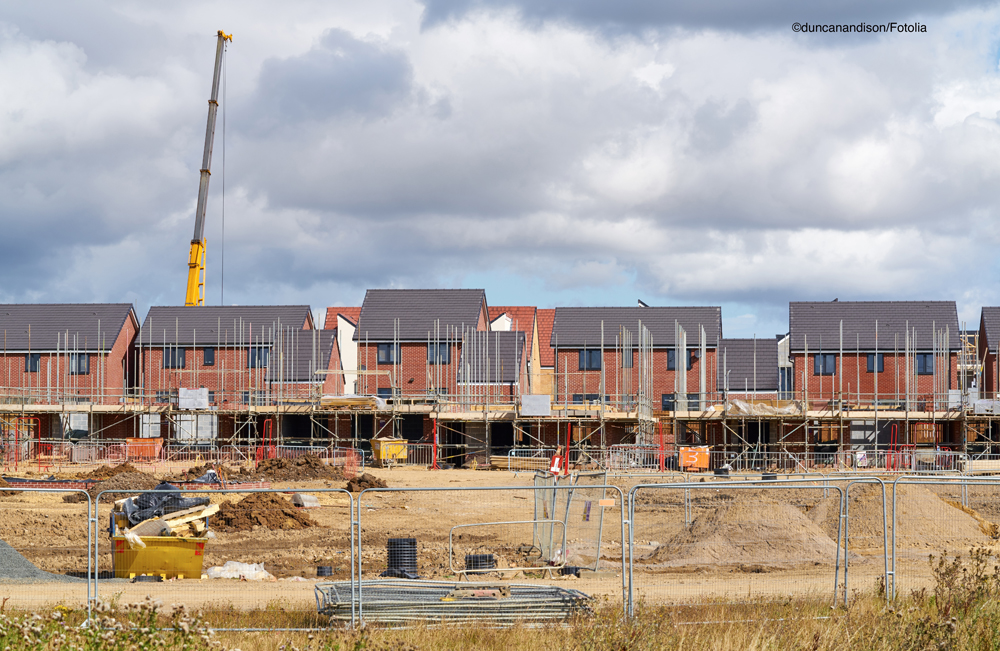
In her speech to the Conservative Party Conference on Tuesday, the Prime Minister announced that the Government will lift the borrowing cap on councils to help support more housebuilding. Here we garner opinion from across the sector to the news.
Ruth Davison, Executive Director of Public Impact at the National Housing Federation, said: “This is a very welcome decision by the Government. For years, everyone who builds affordable homes – both councils and housing associations – have argued this cap on council borrowing puts the brakes on building more homes.
“We know that we need to build 340,000 homes in England alone every year. Last year, only around 160,000 were built. We are so far off building the number of homes we need that councils and housing associations must be able to do more if we are going to solve the housing crisis.
“Housing associations are already working hard to build the homes that people need – this announcement will allow them to work more effectively in partnership with councils, pooling their resources and maximising their impact.”
Councils must play a critical role in helping tackle the national housing crisis and this announcement could help them reach their potential says Chartered Institute of Housing. CIH Director of Policy and External Affairs Gavin Smart said: “This is excellent news and we look forward to seeing the detail. We have been calling on the Government to lift the local authority borrowing cap to help councils build more genuinely affordable homes so it’s great to see the Prime Minister listening to the voice of housing professionals.
“If we are to have any hope of tackling our national housing crisis, councils must play a critical role and this move will help them reach their potential. But of course it’s not just a numbers game – we need to make sure we are building the right homes, in the right places, at the right prices. That’s why it is so important to give councils the tools they need to build more truly affordable homes for social rent.”
Prime Minister’s announcement shows a recognition that councils are a vital part of housebuilding solution. Responding to the announcement Lord Porter, Chairman of the Local Government Association, said: “The speech by the Prime Minister shows that the Government has heard our argument that councils must be part of the solution to our chronic housing shortage.
“It is fantastic that the Government has accepted our long-standing call to scrap the housing borrowing cap. We look forward to working with councils and the Government to build those good quality affordable new homes and infrastructure that everyone in our communities need.
“Our national housing shortage is one of the most pressing issues we face and it is clear that only an increase of all types of housing – including those for affordable or social rent – will solve the housing crisis.
“The last time this country built homes at the scale that we need now was in the 1970s when councils built more than 40% of them.
“Councils were trusted to get on and build homes that their communities needed, and they delivered, and it is great that they are being given the chance to do so again.”
Lovell Managing Director Steve Coleby commented: “There have long been calls for the scrapping of the borrowing cap which has significantly restricted the number of homes local authorities can deliver. The announcement is great news and we strongly welcome it as a move which will help address the profound shortage of affordable homes across the UK.
“As a partnership homes developer which works closely with both local authorities and housing associations across the UK to deliver the new homes which are so urgently needed, we believe all sector partners have a crucial part to play in creating more housing available and affordable to people across a wide range of incomes.”
The Prime Minister’s borrowing cap announcement is welcome and needs to be rolled out without delay says RTPI. Tom Kenny, Policy Officer of the Royal Town Planning Institute, said: “Having local authorities back as key players in the housing market is vital to tackling the housing crisis. The Prime Minister’s move to scrap the HRA borrowing cap is welcome and needs to be rolled out with no further delay – this was the top recommendation of our research into local authority housebuilding. We also need to give councils more powers to assemble sites with the infrastructure needed to support them – either to build housing themselves or to offer sites to a diverse set of housebuilders including housing associations, self-builders and SMEs.”
The Federation of Master Builders (FMB) says the Prime Minister’s announcement about lifting the borrowing cap on councils to allow them to build many more homes is a victory for bold thinking and common sense. Brian Berry, Chief Executive of the FMB, commented: “This is the most exciting, and potentially transformative, announcement on council housing for many years. It is something the housebuilding sector and local authorities have been crying out for since the last economic downturn as a means by which to increase house building.
“Indeed, the only times the UK has built sufficient numbers of homes overall is when we’ve had a thriving council house building programme. Local authorities have a strong interest in delivering new affordable homes and many would have the appetite to directly fund this, but have been frustrated from doing so by an artificial cap on their ability to borrow against their assets to build homes. In a victory for common sense, Mrs May has now signalled that the borrowing cap will be scrapped to allow councils to build many more new homes.”
Brian continued: “We believe this could also have the added benefit of expanding the capacity of the private sector by providing more opportunities for SME builders. In this way, a stronger public sector housebuilding programme can complement and help support a stronger, more diverse private sector. The private sector will continue to take the lead in delivering new homes, and to ensure it can do so, we need to continue to lay the foundations for a diverse private sector in which new firms can more easily enter the market and small firms can more easily prosper and grow. However, in order to deliver the number of new homes the Government is targeting it is going to be necessary for the private and public sectors to both be firing on all cylinders. That’s why this announcement is so welcome.
“However, as much as this is a bold and praiseworthy move by the Prime Minister, new homes of any sort will not get built if we as an industry don’t have the people we need to build them. Recent announcements on post-Brexit immigration rules, if implemented as currently understood, will be a serious threat to our ability to deliver on the promise of this policy. The failure of the Government so far to listen to the construction industry could unfortunately threaten the delivery of the Government’s increasingly bold moves to solve the housing crisis.”
Lifting the borrowing cap for councils will diversify the housing market, stimulate industry capacity and help councils more easily meet their affordable homes requirements believes the Housing Builders Association. The HBA, the housebuilding division of the National Federation of Builders (NFB), is delighted that the Government is helping tackle the crippling house crisis, by listening to the industry and finally addressing concerns which the HBA has lobbied on for quite some time.
The HBA has had the cap on local authority borrowing for new housebuilding as a measure in all of its past manifestoes and the entire supply chain has worked hard towards achieving this. Lifting councils’ housebuilding cap will now help small and medium-sized (SME) builders and councils to work together to deliver the Governments’ target of delivering 300,000 homes a year.
Richard Beresford, Chief Executive of the NFB, commented: “The NFB congratulates the prime minister for recognising a substantial barrier preventing the Government from meeting its target to build 300,000 new homes a year. Lifting the borrowing cap for councils will diversify the housing market, stimulate industry capacity and help councils more easily meet their affordable homes requirements. The entire housing supply chain should be very proud of their collective campaigning on this issue.”








